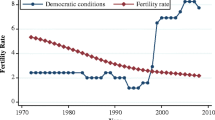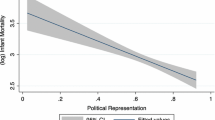Abstract
This article examines the relationship between democracy and gender equality. In particular, it contrasts the impact of long-term stocks of democracy with the contemporary level of democracy and the participation of women in democracy. It contends that democracy should be thought of as a historical phenomenon with consequences that develop over many years and decades and that women’s participation should be included as an important component of democracy. The main argument is that long-term democracy together with women’s suffrage should provide new opportunities for women to promote their interests through mobilization and elections. A cross-national time-series statistical analysis finds that countries with greater stocks of democracy and longer experience of women’s suffrage have a higher proportion of the population that is female, a greater ratio of female life expectancy to male life expectancy, lower fertility rates, and higher rates of female labor force participation.
Similar content being viewed by others
Notes
According to its most recent report, however, Freedom House does incorporate gender equality as a very minor subset of civil liberties (Freedom in the World 2007).
The life expectancy ratio is calculated using interpolated data. Data are interpolated using Stata’s ipolate function.
The schooling data are interpolated using Stata’s ipolate function.
References
Abrams BA, Settle RF. Women's suffrage and the growth of the welfare state. Public Choice. 1999;100(3-4):289–300.
Alvarez SE. Engendering democracy in Brazil: women’s movements in politics. Princeton: Princeton University Press; 1990.
Barro RJ, Lee J-W. International data on educational attainment: updates and implications. CID Working Paper No. 042. Harvard University: Cambridge, MA; 2000.
Bollen KA. Cross-national indicators of liberal democracy, 1950-1990. Codebook. University of North Carolina: Chapel Hill, NC; 1998.
Bouvard MG. Revolutionizing motherhood: the mothers of the Plaza de Mayo. Wilmington: Scholarly Resources; 1994.
Brown DS. Democracy and gender inequality in education: a cross-national examination. Br J Polit Sci. 2004;34(1):137–52.
Conway MM. Women and political participation. PS, Polit Sci Polit. 2002;34(2):231–3.
Donno D, Russett B. Islam authoritarianism, and female empowerment: what are the linkages? World Polit. 2004;56(4):582–607.
Duverger M. Political parties, their organization and activity in the modern state. London, Methuen; 1954.
Esping-Andersen G. Social foundations of postindustrial economies. Oxford: Oxford University Press; 1999.
Fish MS. Islam and authoritarianism. World Polit. 2002;55(1):4.
Folbre N. Of patriarchy born: the political economy of fertility decisions. Fem Stud. 1983;9(2): 26–84.
Folbre N. Who pays for the kids? Gender and the structures of constraint. London: Routledge; 1994.
Folbre N. Reforming care. Politics Soc. 2008;36(3):373–87.
Gerring J, Bond P, Barndt WT, Moreno C. Democracy and economic growth: a historical perspective. World Polit. 2005;57(3):323–64.
Gornick JC, Meyers MK. Creating gender-egalitarian societies: an agenda for reform. Polit Soc. 2008;36(3):313–49.
Grown C, Gupta GR, Khan Z. Promises to keep: achieving gender equality and the empowerment of women. Washington D.C.: International Center for Research on Women; 2003.
Hausmann, Ricardo, Laura D. Tyson, and Saadia Zahidi. 2007. The Global Gender Gap Report 2007. Geneva, Switzerland: World Economic Forum.
Htun M. Sex and the state: abortion, divorce, and the family under Latin American dictatorships and democracies. Cambridge: Cambridge University Press; 2003a.
Htun MN. Women and democracy. In: Dominguez JI, Shifter M, editors. Constructing democratic governance in Latin America. Baltimore: The Johns Hopkins University Press; 2003b.
Infante M. The changing status of women in Spain from 1960–1990. Mod Eur Research. 2000;6:77–93.
Inglehart R, Norris P, Welzel C. Gender equality and democracy. Comp Sociol. 2002;1(3/4):321.
Iversen T, Rosenbluth F. The political economy of gender: explaining cross-national variation in the gender division of labor and the gender voting gap. Am J Polit Sci. 2006;50(1):1–19.
Jaquette JS. The women's movement in Latin America: participation and democracy. 2nd ed. Boulder: Westview; 1994.
Jaquette JS, Wolchik SL. Women and democracy: Latin America and Central and Eastern Europe. Baltimore: Johns Hopkins; 1998.
Jutting JP, Morrisson C, Dayton-Johnson J, Drechsler D. Measuring gender (in)equality: the OECD gender, institutions and development data base. J Hum Dev. 2008;9(1):65–86.
Kenworthy L, Malami M. Gender inequality in political representation: a worldwide comparative analysis. Soc Forces. 1999;78(1):235–69.
Klasen S. UNDP's gender-related measures: some conceptual problems and possible solutions. J Hum Dev. 2006;7(2):243–74.
Lott JR Jr, Kenny LW. Did women's suffrage change the size and scope of government? J Polit Econ. 1999;107(6):1163–98.
Luciak IA. Party and state in Cuba: gender equality in political decision making. Polit Gend. 2005;1(02):241–63.
Lundberg S, Pollak RA. Separate spheres bargaining and the marriage market. J Polit Econ. 1993;101(6):988.
Mahony R. Kidding ourselves: breadwinning, babies, and bargaining power. New York: Basic Books; 1995.
McDonagh E. Political citizenship and democratization: the gender paradox. Am Polit Sci Rev. 2002;96(3):535.
Mitchell NJ, McCormick JM. Economic and political explanations of human rights violations. World Polit. 1988;40(4):476–98.
Paxton P. Women in national legislatures: a cross-national analysis. Soc Sci Res. 1997;26(4):442–64.
Paxton P. Women's suffrage in the measurement of democracy: problems of operationalization. Stud Comp Int Dev. 2000;35(3):92.
Przeworski A. Democracy and development: political institutions and well-being in the world, 1950–1990. Cambridge: Cambridge University Press; 2000.
Reynolds A. Women in legislatures and executives of the world. World Polit. 1999;51(4):547.
Richards DL, Gelleny R. Women's status and economic globalization. Int Stud Quart. 2007;51(4):855–76.
Rueschemeyer M. Women in the politics of postcommunist Eastern Europe. Rev. and expanded. Armonk: M.E. Sharpe; 1998.
Russett BM. Grasping the democratic peace : principles for a post-Cold War world. Princeton: Princeton University Press; 1993.
Schumpeter JA. Capitalism, socialism, and democracy. 3rd ed. Harper: New York; 1962.
Seguino S. Gender inequality and economic growth: a cross-country analysis. World Dev. 2000;28(7):1211.
Seguino S. Plus Ca Change? Evidence on global trends in gender norms and stereotypes. Fem Econ. 2007a;13(2):1–28.
Seguino S. The great equalizer? Globalization effects on gender equality in Latin America and the Caribbean. In: Shaikh A, editor. Globalization and the myths of free trade. London: Routledge; 2007b.
Smith LM, Padula A. Sex and revolution : women in socialist Cuba. New York: Oxford University Press; 1996.
United Nations Research Institute for Social Development. Gender equality—striving for justice in an unequal world. Geneva, Switzerland: United Nations Research Institute for Social Development; 2005.
Waylen G. Women and democratization. World Polit. 1994;46(3):327.
Zoepf K. Women lead an Islamic revival in Syria, testing its secularism. New York Times, August 29, 2006, 1, 2006.
Author information
Authors and Affiliations
Corresponding author
Rights and permissions
About this article
Cite this article
Beer, C. Democracy and Gender Equality. St Comp Int Dev 44, 212–227 (2009). https://doi.org/10.1007/s12116-009-9043-2
Published:
Issue Date:
DOI: https://doi.org/10.1007/s12116-009-9043-2




